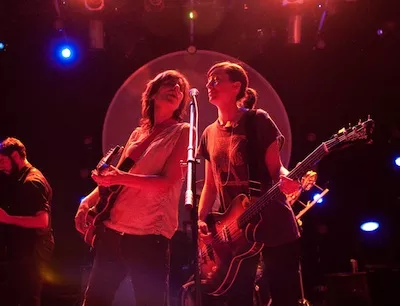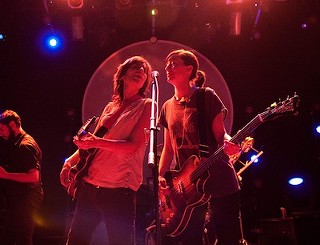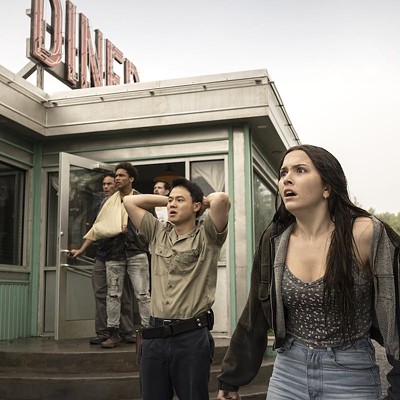
Trigger
Tuesday September 21st, 7:10pm, Park Lane 4
Built into its very name, rock 'n' roll is a duality.
Two kinds of energy meet and intermingle. A single force forms and reforms. Point and counterpoint; counterpoint becomes point and vice versa.
In that way, rock 'n' roll resembles life. It is life. (I can't imagine my life so far, and to come, my life with my wife Sue, without the thought, wakefulness and beauty the music gives me daily.)
The duo of Daniel MacIvor (writer) and Bruce McDonald (director) deliver a film about life, some of its interconnected and universal concerns, in Trigger. One may express these themes as a series of dualities, too: addiction/recovery, acceptance/rejection, spirituality/physicality, friendship/estrangement, purpose/achievement.
That the film centres on a social reunion of Vic (played by the late Tracy Wright) and Kat (Molly Parker), the core of the now-defunct Trigger, is besides the point.
Rock 'n' roll is the vehicle, not the destination.
During and through conversation, argument and recrimination, Kat and Vic, two old friends and bandmates, revisit the past, reevaluate their present and reconcile themselves to the future. The band, its breakup, their daily lives, work, bodies and minds, hopes and fears all come under consideration.
This is a dialogue-driven movie. Talk is fast and overlaps. It trails off. And picks up again, as it goes in life outside the frame. MacIvor is one of the country's leading writers, and actors, for stage and screen, but some of his films have felt too directed, or loaded (for me, it's usually the ensemble pieces such as Marion Bridge or Wilby Wonderful). The density, the wordiness, works. This is how two friends, men or women, speak with one another. One might think while the other vocalizes; then the roles reverse. There's no chronology, no linear sense, or logic to it at some points.
The story works because the script sounds so natural coming from these two actors.
Parker communicates Kat's fragile interior, contained within an exterior of accomplished cool. Back from LA, Kat asks "How are you?" in that insincere way that sounds less like a question and more like a statement (I am asking you how you are.) Getting that tone and intent down is harder than it sounds.
There're looks that Kat gives Vic, who still makes music (on her own, acoustically and privately to this point), that express the loss, the lack of a life purpose, that Kat is experiencing. Parker's performance is often, by necessity, quiet.
That's not to say the film belongs to Tracy Wright/Vic. Vic and Kat need each other. This is a two-hander, to use a stage term. Wright's illness, which ultimately took her life, had already been diagnosed before Trigger started shooting, but her performance stands on its own, apart from her passing.
Wright looks and feels the part of Vic, whose defiance, though still present, is decreasing with age. While Kat was the drinker, Vic was the user. They memorably exchange on being tired and how that feeling of fatigue made them feel normal; in touch with the rest of humanity.
This resonates with anyone in (arbitrarily of course) their mid- to late 30s and up, whether you're a man or woman, been in a band or not, used and abused or not. It's another way of expressing the universal passage of youth—-of reaching that point of no return—-into adulthood.
Vic embodies the continuation of creativity into adulthood, a commitment to the practice, the idea of it giving purpose and not achieving a goal (fame, wealth). As mentioned before, Vic still makes music. Kat, who works in TV in L.A., doesn't. Vic warily receives overtures from a record label A&R rep (a cameo by Callum Keith Rennie who was one half of the duo in Hard Core Logo). His appearance, demeanour and short backstory (he spends a lot of time golfing in Florida) is spot-on to anyone who's worked and dealt with today's music industry professionals.
Trigger is a considered, not a deliberated, movie.
Visually, McDonald concentrates on the two figures, using two-shots of Kat and Vic at a restaurant table or sitting side-by-side on a bench in Allan Gardens in Toronto—-talking. This is as it should be. In this way, Greenberg (the scenes between Ben Stiller and Rhys Ifans) and Trigger have much in common, more than, say, Hard Core Logo. Trigger isn't the female version of that other McDonald movie.
McDonald early on uses some over digital effects to express the wiry daydreams Vic and Kat envision upon seeing each other after a long absence. As the film goes on, he becomes more reserved in its use (reserving it for Vic's double speaking to her) and that causes a bit of distraction: the viewer has an expectation that such motifs will continue.
The director shows the band, Trigger, in their heyday on stage only once: an abstracted black-and-white sequence that opens the film. Set to a plaintive, almost chamber-styled soundtrack piece, the montage/footage appears at once as actors' pantomime/band's performance. We see but don't hear Vic playing lead guitar and singing backup, while Kat sings lead and plays occasional bass.
An onstage reunion at a Women in Rock tribute is held as a potential event, a possible and forthcoming catharsis. Whether it happens or not is best experienced by seeing the film.














